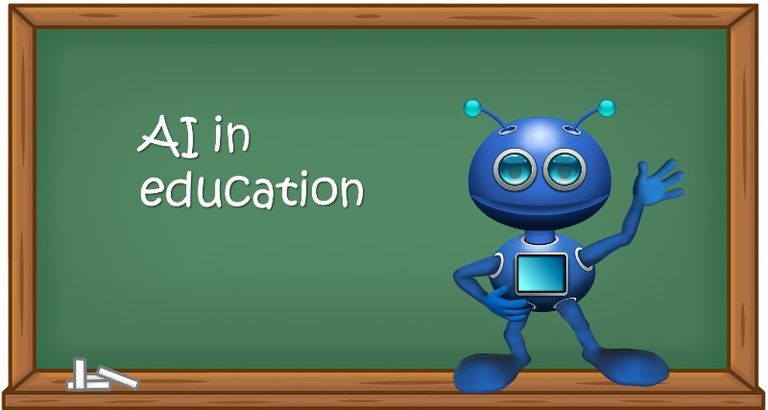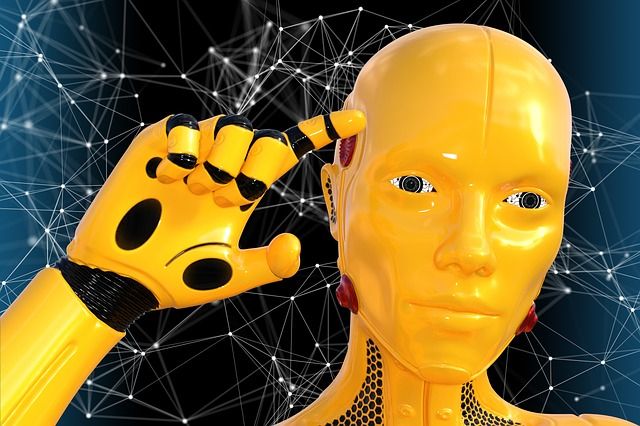Hi Guys!
Greeting to all, hope you all are well and good and enjoy happy moments of life. I am also good. |
|---|

Image designed by @emimoron with images from pixabay.com: board, robot.
According to UNESCO, Artificial Intelligence (AI) in education has the potential to address some of the biggest challenges facing education today, to develop innovative teaching and learning practices.
What may still sound like science fiction, in reality is already being applicable, Artificial Intelligence is bursting into projects and institutions of all kinds, using fields such as Machine Learning and Deep Learning, algorithms that can learn on their own are being achieved, which offers numerous possibilities.
And logically, an educational institution, as well as any other company, can take advantage of these innovations to obtain multiple benefits, in addition, the digital transformation is already here, and the education sector cannot, and should not, be left behind, because it is a reality that will determine the way we relate in the future.
But how does AI relate to education?
You may be thinking that AI is reserved for large industries and corporations that must stay on the cutting edge of technology, but that's not really the case, although certainly, in sectors like education, AI is still exploring its possibilities.
But as UNESCO has recognized, AI has the potential to transform education, and according to the organization, "it will revolutionize teaching methods, ways of learning, accessing knowledge and training teachers. Thus, this innovation can reduce the difficulties of access to learning by identifying actions to address inequalities linked to socioeconomic, gender or ethnic status, for example; it can also improve teaching methods by identifying new forms of personalized learning; and it can support teachers by automating the management processes involved in education and reducing teachers' repetitive tasks.
Therefore, AI will be a great ally to give more value to students and improve the positioning of the institution, since, with the large volume of data collected by educational institutions about their students, a more efficient data analysis would allow a better understanding of their profile, skills and needs. An online learning system could suggest to the student a way to organize their studies to better assimilate the information or even put them in contact with a study group with which they have an affinity to promote collaborative learning.
With an AI-powered system, the teacher could be freed from repetitive tasks such as grading, since the system itself could run an algorithm that would grade the students' evaluation instruments, leaving them more time to focus on research or a personalized approach to the students' needs.
Such a platform would help the institution to better monitor student performance, an algorithm in the educational platform could identify patterns in students, such as difficulties in a specific area, and predict the probability that they will end up dropping out of their studies, which will allow taking the necessary actions to promote their learning, thus avoiding high dropout rates.

AI can be engaged in monitoring student performance and tasks such as grading. Image from Pixabay.com
Such a platform would help the institution to better monitor student performance, an algorithm in the educational platform could identify patterns in students, such as difficulties in a specific area, and predict the probability that they will end up dropping out of their studies, which will allow taking the necessary actions to promote their learning, thus avoiding high dropout rates.
In short, the range of possibilities can be very wide and even quite specific to the needs of each institution, but it is a great opportunity for the education sector to adapt to new technological trends, something that requires teachers and students to be updated in the use of the available tools; Something that can sometimes be a great challenge, because in the education sector, although it may seem contradictory, we usually find a lot of opposition to change, I say this as a university teacher, usually teachers are comfortable with their standardized procedures and their usual teaching method that often does not distinguish the individualities of students and treats them all the same. But the digital transformation continues its course, and sooner rather than later educational institutions will have to use the technological tools available to keep up with the technological context of society.
I hope you liked the information, see you next time!
Your Post Has Been upvoted By @blurt-pakistan. Thank You For using the #blurtpakistan Tag.